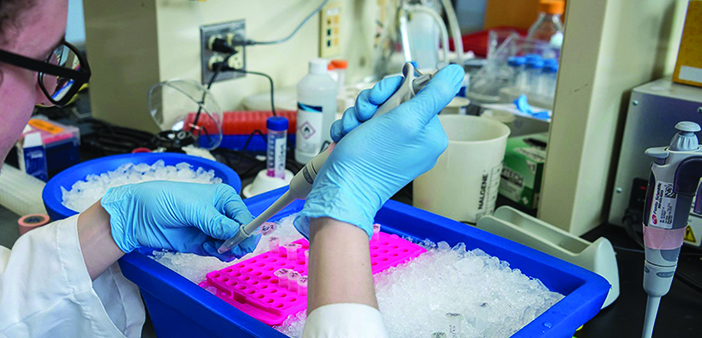As researchers turn discoveries into therapies, Brown was named one of the top US schools for utility patents granted in 2023.
Brown University ranks among the top 100 universities in the nation for the number of utility patents issued in 2023, according to a list released by the National Academy of Inventors and based on federal government data. Published annually, the ranking highlights universities that play a significant role in advancing innovation and invention in the United States.
Brown secured 22 utility patents from the United States Patent and Trademark Office last year based on work by faculty members and investors on campus, landing the No. 72 slot on the Top 100 list.
“This recognition by the National Academy of Inventors shows both the productivity of Brown faculty and the University’s commitment to protecting and commercializing intellectual property,” says Neil Veloso, executive director of Brown Technology Innovations.
Brown Technology Innovations, the University’s technology transfer office, supports the commercialization of technology and research discoveries made by Brown faculty and researchers and is responsible for managing the University’s patent portfolio.
“Commercialization allows Brown researchers to extend the impact of their science by creating goods and services that can further benefit society,” Veloso says.
As an example of how Brown Technology Innovations office supports the commercialization of research, Veloso points to US Patent 11,793,814: “Compositions and methods for treating, preventing or reversing age-associated inflammation and disorders.”
This patent, issued in October 2023, stems from research led by John Sedivy, PhD, the Hermon C. Bumpus Professor of Biology and associate dean and director of the Center on the Biology of Aging, on the mechanisms of inflammation that are a hallmark of aging. This research led to the discovery that a class of drugs called reverse transcriptase inhibitors could be used to treat neurodegenerative diseases such as progressive supranuclear palsy, amyotrophic lateral sclerosis, frontotemporal dementia, and eventually, Alzheimer’s disease.
The patent was licensed to a start-up company Sedivy co-founded called Transposon Therapeutics, which is currently developing new proprietary reverse transcriptase inhibitors. Sedivy is conducting a clinical trial at Brown and Butler Hospital using a non-proprietary, FDA-approved reverse transcriptase inhibitor known as emtricitabine to treat Alzheimer’s disease.
“The patent is on the scientific discoveries made in the lab than can be used to develop therapeutics to treat people with neurodegenerative diseases,” Sedivy says.




